Carl Gustav Jung, “Psychology and Religion" (1938)
1) Introduction
Charles Xavier is by many considered to be the next best thing to a saint, a man who has suffered being crippled three times, who has continuously put his own life and happiness on the backburner to see his dream of a better world fulfilled. Yet here is a man who seems to draw disaster to himself and his loved ones on a regular basis, a man who went bad several times, once with catastrophic results.
The simple dangers of the superhero life? Or did the flaws in his character make the horror that was Onslaught inevitable? And if so, what exactly are those flaws?
2) A case of repression
From the beginning, Charles was the consummate ‘good guy’ - academic, athletic and empathetic. He tried to be a help to his early widowed mother and was the  victim of his stepbrother Cain’s violence. Aware of the advantage his powers gave him in comparison to others, he tried to be fair to the others and, for example, no longer took part in sports, although he could have been a star athlete. He generally kept calm and repressed any anger. Even when Moira Kinross’ jealous boyfriend, Joe, was goading him, Charles avoided a physical confrontation, though the other man’s hints that he was a wimp angered him. [X-Men (1st series) #117, Uncanny X-Men #389]
victim of his stepbrother Cain’s violence. Aware of the advantage his powers gave him in comparison to others, he tried to be fair to the others and, for example, no longer took part in sports, although he could have been a star athlete. He generally kept calm and repressed any anger. Even when Moira Kinross’ jealous boyfriend, Joe, was goading him, Charles avoided a physical confrontation, though the other man’s hints that he was a wimp angered him. [X-Men (1st series) #117, Uncanny X-Men #389]
Xavier always dealt with negative emotions by repressing them. The only times when he was unable to do so as a young man seemed to be connected to his stepbrother, Cain Marko. Physically abused by his own father, Cain resented Charles both for his brains and success and for the fact that his own father seemed to prefer Charles to him. Growing up, he therefore made his stepbrother’s life hell. Charles snapped once, finally using his powers and beat Cain up.
Later during the war, when Charles and Cain coincidentally ended up in the same unit, they chanced upon a cave where Cain found the Gem of Cyttorak.  When Charles saw his brother Cain transformed into the Juggernaut and be buried in a cave-in, he never notified anyone and prayed that the transformed Cain would never be found. Was he simply deeply concerned about the evil power that the irresponsible Cain had gained or was there in fact some subconscious revenge going on against the stepbrother who had made his life hell during adolescence? It is interesting to note, after all, that one of the first things Onslaught did, after he had gained consciousness, was to beat the Juggernaut within an inch of his life. [X-Men (1st series) #12, Uncanny X-Men #322]
When Charles saw his brother Cain transformed into the Juggernaut and be buried in a cave-in, he never notified anyone and prayed that the transformed Cain would never be found. Was he simply deeply concerned about the evil power that the irresponsible Cain had gained or was there in fact some subconscious revenge going on against the stepbrother who had made his life hell during adolescence? It is interesting to note, after all, that one of the first things Onslaught did, after he had gained consciousness, was to beat the Juggernaut within an inch of his life. [X-Men (1st series) #12, Uncanny X-Men #322]
3) Mother’s little helper
Xavier seemed to have a full-blown case of helper syndrome. As a child, he tried taking care of his mother, who was depressed and an alcoholic. Throughout his life, Charles was drawn to needy people, 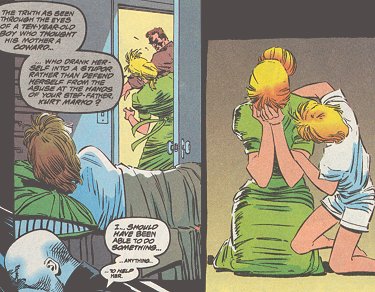 in a way understandable, due to the empathic nature of his powers. The most difficult and questionable case was his relationship with Gabrielle Haller. Gabrielle was a Holocaust victim who had been so traumatized that she had become completely catatonic. Xavier used his mental abilities to force her out of her catatonia and later befriended the young woman. Gabrielle made advances, believing to be in love with him, as patients often do with their therapists. Ignoring that behavior like this could cost any proper therapist his license, instead of rejecting Gaby, Xavier, heartbroken himself over the loss of Moira, began an affair with her, believing that it couldn’t hurt either of them. Of course, Gaby who was pregnant as a result was hurt, to the point where later she refused for years to ask Xavier for help when her son went through a trauma similar to hers.
in a way understandable, due to the empathic nature of his powers. The most difficult and questionable case was his relationship with Gabrielle Haller. Gabrielle was a Holocaust victim who had been so traumatized that she had become completely catatonic. Xavier used his mental abilities to force her out of her catatonia and later befriended the young woman. Gabrielle made advances, believing to be in love with him, as patients often do with their therapists. Ignoring that behavior like this could cost any proper therapist his license, instead of rejecting Gaby, Xavier, heartbroken himself over the loss of Moira, began an affair with her, believing that it couldn’t hurt either of them. Of course, Gaby who was pregnant as a result was hurt, to the point where later she refused for years to ask Xavier for help when her son went through a trauma similar to hers.
It is interesting to note that Charles also fell in love with a young girl whom he helped in a similar way to Gaby - Jean Grey - 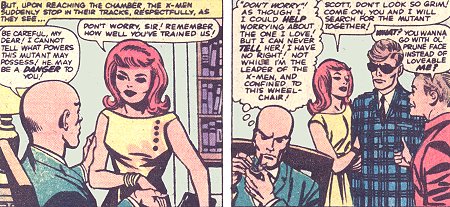 who became catatonic due to the emergence of her yet uncontrollable telepathy. In her case, though, Xavier, who had apparently become better at distancing himself from others, repressed his feelings to a point where he himself ignored the attraction, though Jean remained the student always closest to his heart.
who became catatonic due to the emergence of her yet uncontrollable telepathy. In her case, though, Xavier, who had apparently become better at distancing himself from others, repressed his feelings to a point where he himself ignored the attraction, though Jean remained the student always closest to his heart.
[Uncanny X-Men #309, Uncanny X-Men #161, Bizarre Adventures #27]
4) The good fight
During his journeys after the war, Xavier met several people who would imprint on him the importance of fighting the good fight: Amahl Farouk, aka the Shadow King, the first evil mutant he ran into who showed him how horribly telepathic powers could be abused; Magnus, almost his brother and yet destined to be his foe and 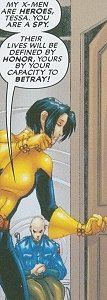 finally the alien Lucifer, who caused Xavier’s legs to be smashed in a cave-in. Xavier had become convinced of the necessity to fight the good fight, but due to circumstance he would not be able to do it himself. He would have to assemble a team to do it. [X-Men (1st series) #20, 117, Uncanny X-Men #161]
finally the alien Lucifer, who caused Xavier’s legs to be smashed in a cave-in. Xavier had become convinced of the necessity to fight the good fight, but due to circumstance he would not be able to do it himself. He would have to assemble a team to do it. [X-Men (1st series) #20, 117, Uncanny X-Men #161]
As a result, years after his fateful accident, he gathered a group of young mutants around him, gifted mutants in their mid to late teens. One of them, Tessa, he even sent into the dangerous Hellfire Club as a spy. One has to wonder why Xavier chose to endanger children instead of looking for adult mutants, which he could have found as easily at the time (e.g. Mastermind, Destiny and so on). Was it because youngsters tend to be more idealistic and, of course, more malleable made better soldiers and were more likely to follow orders? [X-Men (1st series) #1, X-Treme X-Men #3]
5) Abuse of telepathy
After Xavier lost his legs in the Hindu Kush, he met and fell in love with the nurse Amelia Voght, who accompanied him back to the United States.  Despite her pleading, Xavier would not relent in his plan to gather a mutant strikeforce. When he set his plan in motion, starting with taking in Scott Summers, Amelia announced that she would leave him. Xavier automatically reached out with his powers to try and make her stay. He stopped himself a moment later, realizing how despicable this act was, but the bond between him and Amelia was shattered. As a result, though, Xavier learned to act more responsibly with his immense powers, or did he? [Uncanny X-Men #309]
Despite her pleading, Xavier would not relent in his plan to gather a mutant strikeforce. When he set his plan in motion, starting with taking in Scott Summers, Amelia announced that she would leave him. Xavier automatically reached out with his powers to try and make her stay. He stopped himself a moment later, realizing how despicable this act was, but the bond between him and Amelia was shattered. As a result, though, Xavier learned to act more responsibly with his immense powers, or did he? [Uncanny X-Men #309]
It is true that Xavier never tried to force an innocent to do anything against their will again, but he nevertheless was willing to employ his powers, for example, to make bystanders forget they had seen the X-Men or to save Iceman and Nightcrawler from angry mobs. It seems a little odder that he pulled the same stunt on the Human Torch - after all a fellow superhero -  when Johnny Storm helped the X-Men against the Juggernaut. Understandable acts, however, there were even more shady ones when, for example, he made Beast’s high school friends forget about their friend’s identity for security reasons. Xavier was walking a moral tight rope, and even seemed inconsistent in how far he was willing to go: for example, he had no scruples wiping the minds of Beast’s friends but on the other hand refused to telepathically influence Kitty Pryde’s parents, when they decided to enroll their daughter at the Hellfire Club controlled Massachusetts Academy. Nevertheless, things went well, until at one point he would choose to mindwipe Magneto… [X-Men (1st series) #13, 44-46, Marvel Comics Presents #85-88, Giant-Size X-Men #1, Uncanny X-Men #151-152]
when Johnny Storm helped the X-Men against the Juggernaut. Understandable acts, however, there were even more shady ones when, for example, he made Beast’s high school friends forget about their friend’s identity for security reasons. Xavier was walking a moral tight rope, and even seemed inconsistent in how far he was willing to go: for example, he had no scruples wiping the minds of Beast’s friends but on the other hand refused to telepathically influence Kitty Pryde’s parents, when they decided to enroll their daughter at the Hellfire Club controlled Massachusetts Academy. Nevertheless, things went well, until at one point he would choose to mindwipe Magneto… [X-Men (1st series) #13, 44-46, Marvel Comics Presents #85-88, Giant-Size X-Men #1, Uncanny X-Men #151-152]
6) Secrets and ruthlessness
Xavier kept the fact that their offspring was a mutant from several of his students’ parents (provided they didn’t already know), such as the Greys or the Prydes. Despite his stated goals of equality, he clearly believed that he was better qualified to decide those youngsters’ fates than their own parents. Not that his students fared much better. Xavier clearly felt that there were things that were on a need-to-know basis and his students didn’t need to know. Xavier seemed to have the urge to always be in control.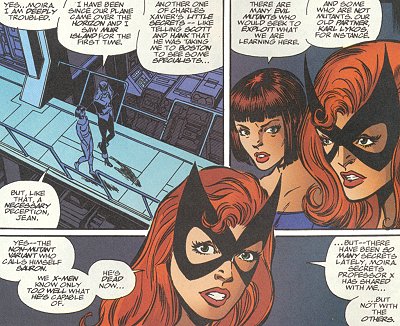 Right from the beginning, the professor stayed cool and aloof towards his students, keeping up a cold façade. He also for a very long time didn’t allow himself any romance after Amelia and kept several secrets from his X-Men, such as the fact that he had worked with Jean Grey far longer than with the rest of the X-Men or his associations with Moira MacTaggert and her mutant research station Muir Isle and with Dr. Karl Lykos (whom he had already identified as a non-mutant variant).
Right from the beginning, the professor stayed cool and aloof towards his students, keeping up a cold façade. He also for a very long time didn’t allow himself any romance after Amelia and kept several secrets from his X-Men, such as the fact that he had worked with Jean Grey far longer than with the rest of the X-Men or his associations with Moira MacTaggert and her mutant research station Muir Isle and with Dr. Karl Lykos (whom he had already identified as a non-mutant variant).
Xavier also secretly created an organization called the “Mutant Underground,” a widespread net of both mutants and humans who helped Xavier less openly than his X-Men. A more cruel deception was Xavier allowing the Changeling to replace him while he prepared to battle the alien Z’Nox. For the upcoming task, he had to train and study in isolation, yet he didn't want to leave his X-Men without a mentor - despite the fact that they had just graduated. Charles didn't consider the effects of the one event that happened, namely that fake Xavier being killed in battle and his students mourning for him. [Uncanny X-Men #305, X-Men (1st series) #42, 65]
Only Jean Grey was privy to several of his secrets, such as the Z’Nox chamber and the replacement of Xavier by Changeling. However, given no instructions for such a case and having no means to contact Charles, the young woman spent long weeks keeping a terrible secret from her teammates. While this was harsh, the practical reasons were apparent, namely – security reasons. Xavier and his fellow telepath, Jean, could protect their minds, whereas the others could not. Nevertheless, given his feelings about Jean, the closeness might also be interpreted in a different way.
7) The Dark Half and the Protocols
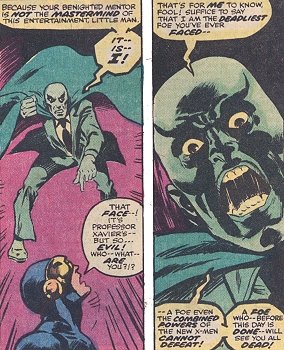 Xavier’s constant striving to suppress darker impulses had good reasons. After having gathered a new team of X-Men, Xavier found himself under constant stress, as he dreamed about a war in a different galaxy (actually a psychic link had been created between him and the fugitive Shi’ar princess, Lilandra, when he had used his mental powers to battle the Z'Nox). One day during a Danger Room session, the new X-Men found themselves attacked by what appeared to be the old team. They were soon revealed to be psychic constructs and the villain behind them seemed to be dark version of Xavier, his repressed darker side that manifested while he was asleep. Waking up from his nightmare, Charles beat his dark self. The psychic constructs disappeared and Xavier found himself a peace once more, his demons at bay. [X-Men (1st series) #106]
Xavier’s constant striving to suppress darker impulses had good reasons. After having gathered a new team of X-Men, Xavier found himself under constant stress, as he dreamed about a war in a different galaxy (actually a psychic link had been created between him and the fugitive Shi’ar princess, Lilandra, when he had used his mental powers to battle the Z'Nox). One day during a Danger Room session, the new X-Men found themselves attacked by what appeared to be the old team. They were soon revealed to be psychic constructs and the villain behind them seemed to be dark version of Xavier, his repressed darker side that manifested while he was asleep. Waking up from his nightmare, Charles beat his dark self. The psychic constructs disappeared and Xavier found himself a peace once more, his demons at bay. [X-Men (1st series) #106]
Years later, though, another more sophisticated version of Xavier’s dark half appeared again. The Microverse was suffering from an onslaught of horrible proportions, forcing its heroes, the Micronauts and its dictator, Karza, to begin an alliance against it. They tracked the Entity’s power to its source on Earth.  The X-Men traveled back to the Microverse with them unaware of the fact that the Entity was Xavier’s dark half, which was free to act and destroy whenever the real Xavier was asleep - in the Microverse, the Entity could affect things in a physical manner as opposed to just use telepathy. With the real Xavier sufficiently weakened, the Entity switched places with him and was now free to roam in the real world, while Xavier had to seek shelter within its already dead body. Eventually, Charles confronted his dark side and, with the bluff that he’d kill them both, he made the Entity flee back to its own body like the coward he was. As that body was already dead, the Entity perished. [X-Men and the Micronauts #1-4]
The X-Men traveled back to the Microverse with them unaware of the fact that the Entity was Xavier’s dark half, which was free to act and destroy whenever the real Xavier was asleep - in the Microverse, the Entity could affect things in a physical manner as opposed to just use telepathy. With the real Xavier sufficiently weakened, the Entity switched places with him and was now free to roam in the real world, while Xavier had to seek shelter within its already dead body. Eventually, Charles confronted his dark side and, with the bluff that he’d kill them both, he made the Entity flee back to its own body like the coward he was. As that body was already dead, the Entity perished. [X-Men and the Micronauts #1-4]
Xavier managed to fend off his dark side both times and his students seemed to accept that. But what caused these entities to be born? Simple stress and anger? In that case, given the stressful, often frustrating lives the X-Men led, isn’t it strange that his students didn’t seem to worry about something like this happening again ?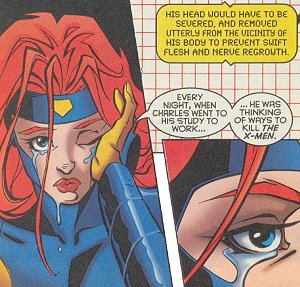
Xavier worried, though, about himself and his students possibly going bad. While he never let the X-Men know, he used his knowledge of them secretly (once again) to create protocols detailing each X-Men’s weakness and how each of them could be slain should the need arise. He also created such a protocol of himself. Those files were then hidden on Muir Isle, to be accessed by certain X-Men in the time of an emergency. [Excalibur (1st series) #100]
8) The Road to hell
Xavier had mellowed over the years with his new students. Finding love with Lilandra - romance being something he hadn’t allowed himself for a long time - and regaining the use of his legs helped, as did having adventures in space with the Starjammers, instead of being burdened with the school. However, upon learning that the Shadow King was back, Xavier returned to Earth with his X-Men. He confronted his archenemy and, as a result, lost the use of his legs again and lost his son Legion to a coma. [Muir Island Saga]
Xavier went on to deal with the job of restructuring the X-Men teams, which had pretty much fallen into disarray. Falling back into old patterns, he repressed his feelings, refusing to deal with the new loss of his legs, until he almost bled to death in the Morlock tunnels. A little later, the professor almost lost his life to an assassination attempt of Stryfe’s. Anti-mutant sentiment was on the rise and the mysterious Legacy Virus was beginning to kill mutants. [Uncanny X-Men #291-293, X-Cutioner’s Song] Under all that stress, Xavier grew more prone to making less than ethical decisions and, when the threat of Magneto loomed once again, he had Storm steal a techno-suit from the government which was to be adapted to be used against Magneto. While she did as Xavier asked, this event caused Storm to remind him if he even still knew what his dream was about. [Uncanny X-Men #305]
Under all that stress, Xavier grew more prone to making less than ethical decisions and, when the threat of Magneto loomed once again, he had Storm steal a techno-suit from the government which was to be adapted to be used against Magneto. While she did as Xavier asked, this event caused Storm to remind him if he even still knew what his dream was about. [Uncanny X-Men #305]
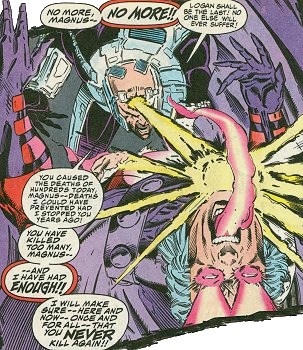
Shortly afterwards, Charles decided to be proactive for once and after Magneto had crashed Illyana Rasputin’s funeral, he, along with a handpicked team of X-Men, confronted Magneto on Asteroid X. When Magneto horribly injured Wolverine, Xavier did the one thing he had avoided doing in the past – he used his power to shut Magneto’s mind off, turning him in essence into a vegetable. This horrific act had consequences none of them could be aware of at the time. For through the psi-link created between the two men at that moment aspects of Magneto’s personality, his rage and frustration escaped into Xavier’s mind and festered in his subconscious, which was already a fertile ground. [Fatal Attractions]
From that moment on, Xavier, while unaware of the fact, became a ticking time-bomb. Another evil self, smarter and deadlier than the previous incarnations, began to form, a creature that intended to achieve Xavier’s dream with Magneto’s methods. While Xavier began acting brasher and angrier, the creature inside himself began to plan. The road to Onslaught had begun.
Many have later tried to excuse Xavier by pointing out that it was Magneto’s aggression and frustration that poisoned Xavier’s mind, so to speak, yet it was Xavier who had gone off the deep end twice before. Xavier was the one who triggered the events that caused Onslaught by erasing Magneto’s mind. Given all the frustrating events after his return to Earth, is it that unlikely that part of him embraced the darkness and anger brought by Magneto? Having made it his goal to be in control all his life, did Xavier perhaps yearn for an opportunity to cut loose?
9) Aftermath
The heroes beat Onslaught and freed Xavier - at a price. Xavier had to face the the fact that his powers were gone after Onslaught and he had to live with the guilt for being at least partially responsible for the horror. In fact, it is quite likely that he was subconsciously repressing his powers himself after the traumatic events, which had shown him where absolute power could lead. That he felt a need to be punished also seems to be corroborated by the fact that he didn't try to do anything to inform other more sympathetic government agents like Val Cooper of Bastion, who was torturing him while he was in custody. [Onslaught: Epilogue]
Eventually, he was freed by the Brotherhood and had his powers returned, after another of his creations - Cerebro - tried to kill him. Charles had to deal with more issues of distrust and in a way another aspect of himself gone bad - or more to the point his evil psychic twin, Cassandra Nova. Cassandra attempted many things to hurt her brother and damage his legacy - his school - not the least of which was outing Xavier as a mutant and revealing to the general public that his school was harboring the X-Men. [The Hunt for Xavier, New X-Men #114-138]
Xavier himself noted afterwards that Cassandra outing the X-Men and therefore forcing him to set events in motion and become a spokesperson for mutants in a way he hadn’t been before was probably one of the best things that had happened to him, as he himself would never have dared give up that secret.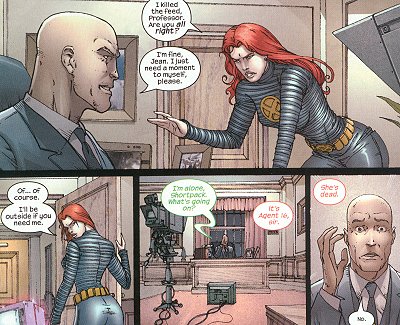 However, it should be not overlooked that, despite this realization, Xavier is still following old patterns: he keeps secrets from his X-Men: there are the undercover agents he employs (like Shortpack and Mystique) for the missions he deems too dirty for the X-Men. Plausible deniability again is a good reason (and Xavier arguably always has good reasons for what he does), but one has to wonder about his persisting distrust and belief that only he knows best. [Mystique #1-3]
However, it should be not overlooked that, despite this realization, Xavier is still following old patterns: he keeps secrets from his X-Men: there are the undercover agents he employs (like Shortpack and Mystique) for the missions he deems too dirty for the X-Men. Plausible deniability again is a good reason (and Xavier arguably always has good reasons for what he does), but one has to wonder about his persisting distrust and belief that only he knows best. [Mystique #1-3]
Also, turning his back on the school, Charles has teamed up with Magneto on Genosha with his X-Men still being none the wiser and believing the master of magnetism to be dead. Once again, with the best of intentions, he is employing the service of youngsters (Shola Inkose, Freakshow, Wicked and Hub), putting them into dangerous situations. Xavier may tell himself that he has no choice, as these youngster are stuck in Genosha and of course he is a teacher and wants to teach them utilize their powers, but one has to wonder if Xavier isn’t simply repeating old familiar patterns and if, as a result, eventually they will pave the road to disaster once more. [Excalibur (3rd series) #1-12]
It should also be noted that Xavier’s evil side grew. The first time being aware of it was enough to destroy it. The second time, Xavier and the Entity were evenly matched. Onslaught, however, almost destroyed the world. One can only hope that this monster was the end of the progression…
has never truly overcome them.
Carl Gustav Jung

The conclusions reached in this article are, to a certain degree, speculative in nature – there’s no claim for them to be entirely accurate, nor that there is no truth beyond the thoughts expressed here.
Of course, everyone is still entitled to their own opinion on the person of Charles Xavier...
